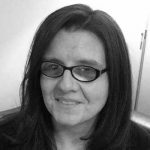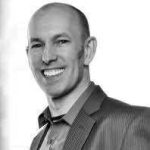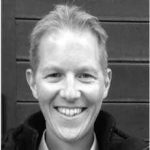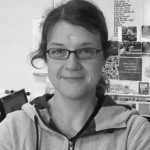Accessibility Scotlands first conference was in 2016 in Edinburgh. It was a huge success and all tickets were sold.
On the 16th September, 70-odd bleary-eyed developers, designers, testers, project managers, and others turned up at Codebase in Summerhall, Edinburgh, lured by promises of coffee and accessibility goodness. While the coffee supplies dwindled, the accessibility goodness flowed out in abundance.
The theme for our first conference focused on digital accessibility and we were very lucky to have some excellent speakers.
Michelle Young: Bridging the visibility employment gap
 Michelle has experience of employing people who are blind and visually impaired on both sides of the recruitment table, having worked in the UK with Guide Dogs, Visibility, Prostate UK and Volunteer Glasgow. Internationally, Michelle has worked with World Access for the Blind as a Perceptual Navigation Instructor and, most recently, with the Royal Bank of Canada.
Michelle has experience of employing people who are blind and visually impaired on both sides of the recruitment table, having worked in the UK with Guide Dogs, Visibility, Prostate UK and Volunteer Glasgow. Internationally, Michelle has worked with World Access for the Blind as a Perceptual Navigation Instructor and, most recently, with the Royal Bank of Canada.
Michelle is a passionate advocate for equal access to education for blind children and young people, believing a full and complete education will facilitate better employment success.
Michiel Bijl: ARIA Authoring practices guide

Michiel Bijl started to research accessibility in 2014 and is now an Accessibility Engineer at The Paciello Group (TPG). To advance web accessibility he is a member of the Accessible Rich Internet Applications Working Group (ARIA WG) and Accessible Platform Architectures (APA WG), as well a participant of the Web Incubator Community Group (WICG).
Gayle Whittaker: The commitment and journey towards accessible digital services
 Gayle Whittaker is a UX consultant for User Vision. She has over 10 years’ experience in designing and delivering user centred solutions. She joined User Vision in 2014 having previously worked at The Scottish Government where she applied usability and accessibility to a variety of ICT projects.
Gayle Whittaker is a UX consultant for User Vision. She has over 10 years’ experience in designing and delivering user centred solutions. She joined User Vision in 2014 having previously worked at The Scottish Government where she applied usability and accessibility to a variety of ICT projects.
Since working at User Vision Gayle has worked with a range of business sectors from public, retail and travel. Gayle’s commitment to inclusive design has enabled her to work with clients to achieve compliance and stronger user-centric products.
Jim Byrne: The practice of keeping a WordPress website accessible
 Jim is an award winning accessible website designer and developer for the Voluntary, Public and Education sector. An accessibility specialist since 1996, Jim is the author of several technical books related to website accessibility.
Jim is an award winning accessible website designer and developer for the Voluntary, Public and Education sector. An accessibility specialist since 1996, Jim is the author of several technical books related to website accessibility.
Alistair Garrison: Utilising QA testing tool frameworks for improved accessibility testing coverage
 Alistair Garrison is a Senior Accessibility Engineer with SSB Bart Group. A passionate and long-time champion of Web Accessibility he has spent the majority of his career devoted to the specification and development of web accessibility evaluation methods, applications, and consultancy services to support accessibility in the Enterprise. Alistair has been an invited expert for W3C/WAI for many years and currently participates in the WCAG 2.0 Task Force for Mobile Accessibility.
Alistair Garrison is a Senior Accessibility Engineer with SSB Bart Group. A passionate and long-time champion of Web Accessibility he has spent the majority of his career devoted to the specification and development of web accessibility evaluation methods, applications, and consultancy services to support accessibility in the Enterprise. Alistair has been an invited expert for W3C/WAI for many years and currently participates in the WCAG 2.0 Task Force for Mobile Accessibility.
Viki Galt: Accessibility testing as part of public procurement process
 After completing a degree as a psychologist Viki worked in mental health before moving into equality and diversity. For the last nine years Viki has worked as the Disability Information Officer at the University of Edinburgh. Her role involves everything from training on law and general disability awareness, conducting Equality Impact assessments, testing software/websites, overseeing a staff computing disability service, writing guidance and policy, and overseeing the provision of assistive technology across the university.
After completing a degree as a psychologist Viki worked in mental health before moving into equality and diversity. For the last nine years Viki has worked as the Disability Information Officer at the University of Edinburgh. Her role involves everything from training on law and general disability awareness, conducting Equality Impact assessments, testing software/websites, overseeing a staff computing disability service, writing guidance and policy, and overseeing the provision of assistive technology across the university.
Mark Palmer: 10 key take aways from 10 years in accessibility
 Mark is an accessibility advocate with 10 years experience of web accessibility, both agency side and client side. In that time he has worked with a wide range of clients including the BBC, Royal Bank of Scotland, HSBC and Exxon. Mark believes in creating usable experiences for people of all abilities and is firmly of the opinion that accessibility is as much about talking, listening and experimenting than it is about ticking boxes.
Mark is an accessibility advocate with 10 years experience of web accessibility, both agency side and client side. In that time he has worked with a wide range of clients including the BBC, Royal Bank of Scotland, HSBC and Exxon. Mark believes in creating usable experiences for people of all abilities and is firmly of the opinion that accessibility is as much about talking, listening and experimenting than it is about ticking boxes.